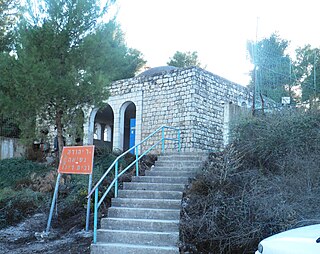
Hasdai ben Abraham Crescas was a Catalan-Jewish philosopher and a renowned halakhist. Along with Maimonides ("Rambam"), Gersonides ("Ralbag"), and Joseph Albo, he is known as one of the major practitioners of the rationalist approach to Jewish philosophy.

Judah II or Nesi'ah I was a Jewish sage who lived in Tiberias in the Land of Israel, in the middle of the third century CE.

Isaac ben Jacob Alfasi ha-Cohen (1013–1103) - also known as the Alfasi or by his Hebrew acronym Rif, was a Maghrebi Talmudist and posek. He is best known for his work of halakha, the legal code Sefer Ha-halachot, considered the first fundamental work in halakhic literature. His name "Alfasi" means "of Fez" in Arabic, but opinions differ as to whether he ever lived in Fez.
Chananel ben Chushiel or Ḥananel ben Ḥushiel, an 11th-century Kairouanan rabbi and Talmudist, was a student of one of the last Geonim. He is best known for his commentary on the Talmud. Chananel is often referred to as Rabbeinu Chananel - Hebrew for "our teacher, Chananel".
Nissim ben Jacob, was a rabbi best known today for his Talmudic commentary ha-Mafteach, by which title he is also known.
Abraham ben David, also known by the abbreviation RABaDRavad or RABaD III, was a Provençal rabbi, a great commentator on the Talmud, Sefer Halachot of Rabbi Yitzhak Alfasi and Mishne Torah of Maimonides, and is regarded as a father of Kabbalah and one of the key and important links in the chain of Jewish mystics.
Moshe haDarshan was chief of the yeshiva of Narbonne, and perhaps the founder of Jewish exegetical studies in France. Along with Rashi, his writings are often cited as the first extant writings in Zarphatic, the Judæo-French language.
Bar Kappara was a rabbi of the late 2nd and early 3rd century CE, during the period between the tannaim and amoraim. He was active in Caesarea in the Land of Israel, from around 180 to 220 CE. His name, meaning "Son of Kapparah", was taken from his father, Eleazar ha-Kappar. He was one of the students of R' Judah haNasi, and an Amora of the first generation.
Rav Pappa was a Babylonian rabbi, of the fifth generation of amoraim.
Isaac ben Samuel the Elder, also known as the Ri ha-Zaken, was a French tosafist and Biblical commentator. He flourished at Ramerupt and Dampierre, France in the twelfth century. He is the father of Elhanan ben Isaac of Dampierre.
Abraham ben Isaac of Narbonne (c. 1080-85 – 1158) was a Provençal rabbi, also known as Raavad II, and author of the halachic work Ha-Eshkol.

Rabbi Jonah ben Abraham Gerondi, also known as Jonah of Girona and Rabbeinu Yonah, was a Catalan rabbi and moralist, cousin of Nahmanides. He is most famous for his ethical work The Gates of Repentance.
Samuel ben Nahman or Samuel [bar] Nahmani was a rabbi of the Talmud, known as an amora, who lived in the Land of Israel from the beginning of the 3rd century until the beginning of the 4th century.
Eliezer ben Jacob I was a Tanna of the 1st century; contemporary of Eleazar Chisma and Eliezer ben Hyrcanus, and senior to Judah ben Ilai.
Zechariah ben Judah Aghmati, also spelled Agamati, was a Rabbi and Talmudist who lived from 1120 CE - 1195 CE in Morocco.
Jehiel ben Jekuthiel Anav, also referred to as Jehiel ben Jekuthiel ben Benjamin HaRofe, who lived in Rome during the thirteenth and fourteenth centuries, was a famous scholar, poet, payton and copyist.
Rabbi Yannai was an amora who lived in the 3rd century, and of the first generation of the Amoraim of the Land of Israel.
Pedat ben Eleazar was a Jewish Talmudist who lived in the Land of Israel in the early 4th century.
Hananiah ben Akavia was a rabbi of the second century.



